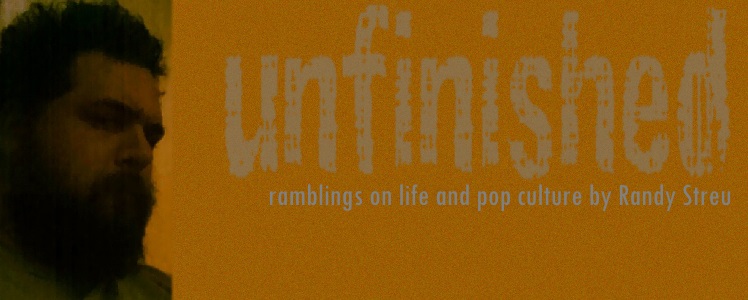My rating: 4 of 5 stars
Though I saw (and loved) the film the year it came out, I had never read the original graphic novel until a few days ago, after buying it at the Borders closeout sale.
I'm glad I did.
The book is a different experience than the movie. While both are dark and violent, the book is more passionate. It's a love letter of sorts, but filled with pain and loss. The author spends as much time coming to terms with the fact of having a loved one ripped from his life as he does imagining bloody revenge on those who caused it. And the book is better for it.
While some reviewers have decried the simplistic storyline and lack of development of villains and peripheral characters, I think these rather miss the point. The story isn't about these characters. Eric isn't on a quest of absolution and forgiveness; he doesn't (and by extension, we don't) really give a damn about who his murderers are as people, or even why they did what they did.
As O'Barr deftly illustrates, revenge isn't about those upon whom we seek revenge. It isn't about current and future victims. Honestly, it isn't even necessarily about the victim for whom we are seeking vengeance. It's about us. Eric's revenge -- and the story itself -- is about Eric. Eric's rampage is itself a love letter written in blood to his dead fiance, and to their life together -- but ultimately it's a letter about his own pain, and his own loss.
At the same time, though, there are those touches of humanity -- not only in Eric, but even in the villains. While they have no real backstory (and again, who needs it?), those upon whom Eric is seeking revenge do often start to come to grips with their own evil. They never apologize for it, but they recognize it. They don't seek -- and Eric doesn't offer -- forgiveness; instead they respond either with rage and indignation or else quiet acceptance.
There are also small touches of realism in the story, which serve to make it that much more poignant. For me, it's often the little things which make or break a story, and O'Barr's attention to minor details really served the story here. One such detail was during the killing of Tom Tom. During the fight between Eric and Tom Tom, Eric used his sword to literally slice the feet out from under his enemy. As Eric gently grills him for information, Tom Tom looks over and says, "those are my boots," failing, in his shock, to realize that his feet are still in them. Minutes later, he asks Eric in an almost childlike way, "my feet are cold. Can I have my boots?" It's almost funny, and a lesser writer would have played the moment for laughs (and, I suppose, some readers will read it that way anyway). In O'Barr's hands, however, the moment is deadpanned and morose. It's not a joke at the villain's expense, but a simple fact of life: this is what shock is.
There are going to be readers who are rather hidebound, and will rail against the non-traditional story structure and the lack of character development for all but the main character. And even with Eric, those same readers will likely complain about the complete lack of character arc. But as I said up top, it's simply not that kind of story. Eric is dead. And, as he explains more than once, those who killed Shelly are also dead already. The story isn't about those characters... it's about Eric's loss, and what he does about it. If he makes a friend or two along the way, those brief glimpses, too, are not about those characters, but about Eric.
 The Detroit of "The Crow" is a wasteland of crime and corruption. Ultimately, Eric's rampage isn't going to change anything for anyone. He's not setting out to be a superhero and rid the city of the festering rot that clings to its very soul. He's not going to make Cpt. Hook's life easier, or get Albrect a promotion. If later glimpses into her life tell us anything, not even Sherri -- the one living person with whom Eric has a nonviolent, semi-personal relationship -- will have her life dramatically improved by his brief entry into it. This is why, I believe, these other characters aren't more fully developed: they are more landscape than they are actual characters. They don't change Eric and, ultimately, he has little impact on them. It's both a realistic choice on the part of O'Barr and non-realistic. Sometimes, we change peoples' lives; sometimes we do not. O'Barr's depiction here is bleak, but not without accuracy.
The Detroit of "The Crow" is a wasteland of crime and corruption. Ultimately, Eric's rampage isn't going to change anything for anyone. He's not setting out to be a superhero and rid the city of the festering rot that clings to its very soul. He's not going to make Cpt. Hook's life easier, or get Albrect a promotion. If later glimpses into her life tell us anything, not even Sherri -- the one living person with whom Eric has a nonviolent, semi-personal relationship -- will have her life dramatically improved by his brief entry into it. This is why, I believe, these other characters aren't more fully developed: they are more landscape than they are actual characters. They don't change Eric and, ultimately, he has little impact on them. It's both a realistic choice on the part of O'Barr and non-realistic. Sometimes, we change peoples' lives; sometimes we do not. O'Barr's depiction here is bleak, but not without accuracy.Don't look for a pleasing conclusion here; for answers on life and death. That's not what "The Crow" is. Instead, "The Crow" is a brooding rumination on loss, and on pain, and on love.
